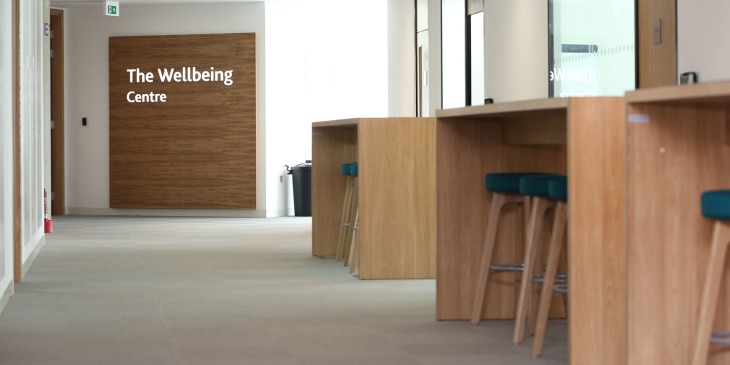Supporting mental wellbeing in the wake of ‘coronasomnia’
This World Mental Health Day, we share how we’re supporting teachers, learners, researchers and our colleagues across the globe with looking after and improving their mental health and wellbeing.

The need for mental health support in communities across the world has become even more pertinent as we continue to feel the various effects of the COVID-19 pandemic on our lives.
Earlier this year, the words coronasomnia, headline stress disorder and home separation anxiety featured in our Cambridge Dictionary New Words blog – demonstrating how the language we use captures some of the ways recent events have had an impact on our wellbeing.
• coronasomnia noun
the condition of being unable to sleep because of anxiety related to the coronavirus pandemic
• headline stress disorder noun
a feeling of stress and anxiety caused by reading or watching a lot of negative or worrying news
• home separation anxiety noun
a feeling of worry and fear about being away from home, especially as a reaction to having spent so much time at home during lockdown
World Mental Health Day is marked annually on 10 October and the theme for 2021 is ‘mental health in an unequal world’.
Seeking support when struggling with mental health and wellbeing is often advised. However, for many people around the world, access to support can differ greatly depending on who we are, where we live, and how much money we have.
At Cambridge University Press & Assessment, we believe in the importance of championing mental health and wellbeing support for all, including our colleagues, teachers, learners and researchers globally.
Mental health support and resources for school leaders, teachers, learners and researchers
One of our 12 outline principles for the future of education is that we believe ‘well-trained and well-supported teachers are central to high quality pedagogy, high attainment and the wellbeing of learners’. That's why we've pulled together a special collection of over 300 academic journal articles and book chapters about mental health to mark World Mental Health Day 2021. The full collection is free to read until the end of October. These include topics of interest to school leaders, such as the impact of cyberbullying on children and young people’s mental health, how to design prevention and intervention practices in schools, and how to put in place screening for mental health issues. More broadly, 28 of the open access pieces are about the impact of COVID-19 on mental health and mental health service provision.
And year in and year out, we are committed to putting the mental health of teachers and learners at the forefront. Across the organisation, we regularly share evidence-based resources and content to support teachers and their students both in and out of the classroom. Some of our latest articles on mental health and wellbeing include:
• Supporting wellbeing in school: enabling young people to fulfil their potential
• Testing times – why test anxiety is an important issue for schools
• Learner wellbeing: thinking beyond learning losses
• Youth Mental Health Day – breathing in nature
• Mindfulness and mental health – how to be kind to yourself and stay positive
• Supporting every teacher: looking after your mental wellbeing
Looking ahead to the global leaders’ Climate Change meeting in November, the British Journal of Psychiatry, which we publish on behalf of the The Royal College of Psychiatrists, looks at how mental health professionals can make their work more sustainable, noting “sustainable practice is good practice”.
Supporting mental health in our communities
We also support our global communities through giving back locally and by working with charitable organisations throughout the year. In the UK two of our charity partners, which are nominated and voted for by colleagues, are: Blue Smile, who support the mental wellbeing of Cambridgeshire pupils with expert arts-based therapies, unlocking children’s potential to learn and be happy; and Coventry and Warwickshire Mind, who provide quality services and support that reduce stigma and promote positive mental health and wellbeing.
Our colleagues are creative and generous with fundraising, and more than £24,000 was donated to Blue Smile and Coventry & Warwickshire Mind during the last year. Fundraising by colleagues is matched by a central fund dedicated to charitable support. Our charity and volunteering colleague network helps our teams with fundraising events, such as virtual events including step and mental health challenges, and quizzes – and even through our ‘buy a coffee’ scheme.
Wellbeing initiatives for colleagues
Alongside our colleague networks, which are run by volunteers, our People Team run programmes as part of our commitment to maintaining our team’s physical and mental health. Our wellbeing programme, which is part of that work, includes providing resources such as a meditation app, support from Healthy Mind Ambassadors who are trained in mental health first aid, and a regular programme of webinars on a range of wellbeing topics. Our next webinar is with Cambridgeshire, Peterborough and South Lincolnshire Mind whose volunteers will talk to us about the indicators that someone’s mental health is in trouble and how to look after our wellbeing.

How do we cope? Strategies to improve mental wellbeing
In the same way that the language we use can tell us about the wellbeing struggles people are facing in their daily lives, it can also give us an indication of the positive strategies people are using to improve the mental and physical health of themselves and others. Some more mental health-related new words we’ve seen used recently are:
• mental health gym noun
a gym that offers activities designed to improve the mental health as well as the physical health of its members
• gleefreshing noun
the activity of refreshing news websites and social media updates on your phone or other device in order to read positive news stories
• social biome noun
the system of relationships and interactions you have with other people, thought to be necessary for good mental and physical wellbeing
• joy strategist noun
someone whose job is to help people to be happier
• vitamin S noun
social contact with other people, considered to be as good for your health as the vitamins in food

A recent post from our Cambridge Dictionary blog writers, Gratitude and me-time, also looks at the language around being positive and relaxed, and the things we do in order to stay that way.
We’d love to hear your own tips and strategies for keeping positive and looking after your mental health and wellbeing – whether at work, home or in school. Let us know by tweeting us at @CambPressAssess.
